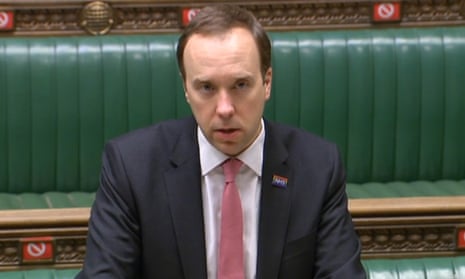Ministers have been accused of an “utterly ridiculous” overreach of power for threatening to impose 10-year jail sentences on travellers dodging quarantine rules.
Jonathan Jones, the government’s former top lawyer who resigned earlier this year, tweeted that he would “eat a face mask” if the sentence was ever imposed, while Labour’s attorney general called it “misleading spin” that would never be enforced.
Boris Johnson’s spokesman confirmed on Wednesday that the 10-year sentence, announced by the health secretary, Matt Hancock, for people lying about returning from travel to coronavirus hotspots, was the maximum penalty allowed under the 1981 Forgery and Counterfeiting Act.
“If people fail to abide by the rules and inaccurately or purposely didn’t fill in the relevant documentation properly, they will be charged under the Forgery Act, which includes forging, or lying on, forms,” he said.
He confirmed that MPs would not be given a say on the new regime because the relevant law already exists. “We’re using existing legislation, so there’s no requirement for a vote.”
Charlie Falconer, Labour’s attorney general, said the policy was intended as a distraction. “It is misleading spin. No judge is ever going to sentence anyone to anything like 10 years for lying on a passenger locator form. If someone was forging and selling fake vaccine certificates that might be a different matter but that is not what the secretary of state is referring to,” he told the Guardian.
“The far more likely scenario is a judge sentencing you to prison for a month or so. It will be nothing like 10 years. It will play no part in the actual policy, all it does is distract from the fact that they have taken so long to come up with this proposal.”
MPs have expressed alarm at way the proposal has been communicated. Sir Charles Walker, the vice-chair of the 1922 Committee of Tory backbenchers, said it was an “utterly ridiculous” suggestion.
“Are you really seriously suggesting, secretary of state, that we’ve got enough prison capacity to start locking up 19-year-old silly kids for 10 years? What a stupid thing to say. It demeans his office, and his position around the cabinet table,” Walker told Sky News.
A number of leading legal voices criticised the measure. Lord Carlile, the former independent reviewer of terrorism legislation, told the Guardian it was “inappropriate for the kind of infraction, serious though it can be, that they have in mind”.
The former attorney general Dominic Grieve said he believed the figure had been “plucked out of the air” and said it could only be the case that the sentence was imposed for forgery. “But this is a regulatory offence, and no regulatory offence I can think of, of this type, attracts a 10-year maximum sentence,” he told the BBC.
“To suggest 10-years sentence for forgery, because I think that’s what it must be because I cannot see how they would ever get a regulatory offence attracting a 10-years imprisonment through parliament, is a mistake.”
England’s former north-west chief prosecutor, Nazir Afzal, who attempted to prosecute Dominic Cummings for allegedly breaching lockdown rules, said the plan was impractical and disproportionate.
He said: “You will get a longer sentence for lying about your travel than you do for carrying a firearm in the street. This wrongly assumes that the police have the resources to investigate your travel arrangements and that the courts with their two-year backlog of trials can hear your case. Of course, people with the means or connections can get round this easily as we have seen many times.”
Stuart Nolan, chair of the Law Society’s criminal law committee, said 10-year sentences for concealing travel arrangements could be brought by decree but this would be an overreach of the government’s power.
He said: “This is contentious; ministers are talking about trampling peoples’ liberty and it is not being debated. And it is rightly contentious given the maximum sentence for theft is now seven years and there’s a high bar for that.
“There is also the practical question of how they are going to enforce it. Boris Johnson wants 10,000 more prison places; there’s a campaign to get more police officers; there have been 10-plus years of underinvestment in the judicial system; an extraordinary backlog going back to pre-Covid times; and this could be a mammoth task if people fail to comply with quarantine.”
